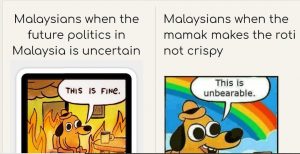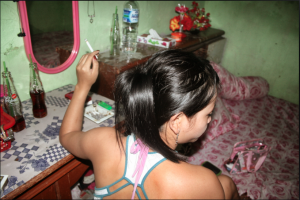 From left to right : Rizal Rozhan, Kelvin Ang, Victoria Cheng, Netusha Naidu, Saran Anandan, Neda Al-Asedi
Projek Dialog has successfully arranged ‘Male Feminists : A Roundtable Discussion’ which was held on the 11th of April 2018 at the University of Nottingham Malaysia Campus under a collaboration with PHIR-Nott (a student society under the School of International Relations). More than 40 people have attended the forum alongside the Moderator, Victoria Cheng from Projek Dialog and the invited panel of speakers.
The panel consists of Rizal Rozhan from Empower, Kelvin Ang from Women’s Aid Organisation, Netusha Naidu from Imagined Malaysia (also a fellow student of University of Nottingham), Saran Anandan and Neda Al-Asedi representing themselves from the University of Nottingham Malaysia Campus. This forum was initially intended to be held one year ago but was cancelled due to the university’s administrative restrictions. Thankfully, the forum was granted approval and it was received positively by the audience consisting mostly of the university students themselves.
Victoria began the forum by thanking the Liyana Nadhirah, the President of PHIR NOTT, for its dedication in organising the event and then proceeded to ask the panel of speakers to introduce themselves. Victoria kickstarted the roundtable with the first question for Kelvin – What are the statistics of gender-based violence and how would his work impact the community.
Kelvin decided to drop the audience a crash course on domestic violence starting from a figure for them to ponder upon: Around 5000 cases were reported by PDRM this year and it continues to grow steadily. Nonetheless, he confessed that the figure was low as there are indeed more unreported cases of domestic violence in the country. ⅔ of the cases were reported by women and ⅓ were by men. He emphasized that the source of domestic violence is related to power within a relationship and that the gender component is also a key factor in the gender of the abuser.
In the PDRM report mentioned, PDRM managed to breakdown not only the gender of the abuser, but also the relationship of the abuser with the victim in a household such as ‘husband to wife’ or even ‘father to son’. Kelvin pinpointed the origins of victimhood and that it began in childhood – Whether the child was conditioned to perform a role based on gender, and how victims have remain trapped in the same cycle in later life.
He later expressed his disappointment towards the authorities’ lack of seriousness in protecting victims because they assume domestic violence to be a petty domestic affair. This is where Women’s Aid Organisation would come in – they help victims access resources that are available in terms of physical, emotional, sexual, social, and financial means. Lastly, he added that Marital Rape has not been classified as a crime in Malaysia (yet!) and how his organisation is formulating an Anti-Stalking Law which is currently in the works.
From left to right : Rizal Rozhan, Kelvin Ang, Victoria Cheng, Netusha Naidu, Saran Anandan, Neda Al-Asedi
Projek Dialog has successfully arranged ‘Male Feminists : A Roundtable Discussion’ which was held on the 11th of April 2018 at the University of Nottingham Malaysia Campus under a collaboration with PHIR-Nott (a student society under the School of International Relations). More than 40 people have attended the forum alongside the Moderator, Victoria Cheng from Projek Dialog and the invited panel of speakers.
The panel consists of Rizal Rozhan from Empower, Kelvin Ang from Women’s Aid Organisation, Netusha Naidu from Imagined Malaysia (also a fellow student of University of Nottingham), Saran Anandan and Neda Al-Asedi representing themselves from the University of Nottingham Malaysia Campus. This forum was initially intended to be held one year ago but was cancelled due to the university’s administrative restrictions. Thankfully, the forum was granted approval and it was received positively by the audience consisting mostly of the university students themselves.
Victoria began the forum by thanking the Liyana Nadhirah, the President of PHIR NOTT, for its dedication in organising the event and then proceeded to ask the panel of speakers to introduce themselves. Victoria kickstarted the roundtable with the first question for Kelvin – What are the statistics of gender-based violence and how would his work impact the community.
Kelvin decided to drop the audience a crash course on domestic violence starting from a figure for them to ponder upon: Around 5000 cases were reported by PDRM this year and it continues to grow steadily. Nonetheless, he confessed that the figure was low as there are indeed more unreported cases of domestic violence in the country. ⅔ of the cases were reported by women and ⅓ were by men. He emphasized that the source of domestic violence is related to power within a relationship and that the gender component is also a key factor in the gender of the abuser.
In the PDRM report mentioned, PDRM managed to breakdown not only the gender of the abuser, but also the relationship of the abuser with the victim in a household such as ‘husband to wife’ or even ‘father to son’. Kelvin pinpointed the origins of victimhood and that it began in childhood – Whether the child was conditioned to perform a role based on gender, and how victims have remain trapped in the same cycle in later life.
He later expressed his disappointment towards the authorities’ lack of seriousness in protecting victims because they assume domestic violence to be a petty domestic affair. This is where Women’s Aid Organisation would come in – they help victims access resources that are available in terms of physical, emotional, sexual, social, and financial means. Lastly, he added that Marital Rape has not been classified as a crime in Malaysia (yet!) and how his organisation is formulating an Anti-Stalking Law which is currently in the works.
 Kelvin discussing WAO’s services and importance to the crowd
Victoria then turned to Rizal for a 2-part question: “How can we succeed in including women in more decision-making roles” and “Is it true that women do not like to be leaders?”. Rizal answered that we would need an overhaul or a systemic change in the way society thinks about women and leadership. This ties in with EMPOWER’s mission statement – ‘The belief that every woman is a Leader’ through advocating gender education in schools.
Rizal also talked about the workshops that EMPOWER does with men to educate them to better understand and support gender equality. He expressed a feeling of defeat when he retold his encounters with many groups of women and girls who are too used to internalized patriarchy; they believe that women should not lead in society. Stereotypes such as menstruation being an obstacle in leadership is deeply engrossed in society that such attitudes have impaired women to move up the ladder and causes them to fall behind in socio-economic development.
Netusha was then put on the spotlight as Victoria asked her about the hidden aspects of Malaysian history focusing on women or the queer community which are not made available in Malaysian textbooks. Netusha began by informing the audience of the importance of her work in providing an alternative historical narrative of Malaysia in order to address gaps in narratives that are reflective of Malaysia’s socio-political terrain.
She shared a few articles from her archive such as news clippings on women leading a demonstration against the Malayan Union, Angkatan Wanita Sedar and how they played a part in the Malay Left-wing nationalist movement, an article written in Jawi which debated feminism’s alleged incompatibility with the teachings of Islam, as well as a photo of a 19th century ceramic artifact which depicts the normalcy of both heterosexual and homosexual intimate relations in Malaysian society that is not publicly known today.
Kelvin discussing WAO’s services and importance to the crowd
Victoria then turned to Rizal for a 2-part question: “How can we succeed in including women in more decision-making roles” and “Is it true that women do not like to be leaders?”. Rizal answered that we would need an overhaul or a systemic change in the way society thinks about women and leadership. This ties in with EMPOWER’s mission statement – ‘The belief that every woman is a Leader’ through advocating gender education in schools.
Rizal also talked about the workshops that EMPOWER does with men to educate them to better understand and support gender equality. He expressed a feeling of defeat when he retold his encounters with many groups of women and girls who are too used to internalized patriarchy; they believe that women should not lead in society. Stereotypes such as menstruation being an obstacle in leadership is deeply engrossed in society that such attitudes have impaired women to move up the ladder and causes them to fall behind in socio-economic development.
Netusha was then put on the spotlight as Victoria asked her about the hidden aspects of Malaysian history focusing on women or the queer community which are not made available in Malaysian textbooks. Netusha began by informing the audience of the importance of her work in providing an alternative historical narrative of Malaysia in order to address gaps in narratives that are reflective of Malaysia’s socio-political terrain.
She shared a few articles from her archive such as news clippings on women leading a demonstration against the Malayan Union, Angkatan Wanita Sedar and how they played a part in the Malay Left-wing nationalist movement, an article written in Jawi which debated feminism’s alleged incompatibility with the teachings of Islam, as well as a photo of a 19th century ceramic artifact which depicts the normalcy of both heterosexual and homosexual intimate relations in Malaysian society that is not publicly known today.
 Netusha presenting an article from The News Straits Times on the projector screen
Before Victoria opened the floor for questions from the students, she raised a question to them regarding the #metoo and #timesup movements that have recently went viral worldwide. She then asked Neda on her thoughts of the movement and what she would like to see more of. Neda points out that the hashtag movement had sparked a wave of following in the west but did not have much following locally. She stressed that the movement was a universal movement because of the common purpose it provides to everyone regardless of nationality, age, gender, race or religion.
Neda hopes that everyone, including men or male allies will speak out more about sexual harassment and women’s rights because it is also important for men to talk about it in as the movement is for everyone, not just women. She highlighted the dilemma some men and male feminists feel – they want to say things on the issue but are afraid to overshadow women’s voices or take up too much space. She points out that men should definitely talk about feminism so that it would help other men to better understand feminism.
Netusha presenting an article from The News Straits Times on the projector screen
Before Victoria opened the floor for questions from the students, she raised a question to them regarding the #metoo and #timesup movements that have recently went viral worldwide. She then asked Neda on her thoughts of the movement and what she would like to see more of. Neda points out that the hashtag movement had sparked a wave of following in the west but did not have much following locally. She stressed that the movement was a universal movement because of the common purpose it provides to everyone regardless of nationality, age, gender, race or religion.
Neda hopes that everyone, including men or male allies will speak out more about sexual harassment and women’s rights because it is also important for men to talk about it in as the movement is for everyone, not just women. She highlighted the dilemma some men and male feminists feel – they want to say things on the issue but are afraid to overshadow women’s voices or take up too much space. She points out that men should definitely talk about feminism so that it would help other men to better understand feminism.
 Audience enjoying the exchange of dialogues between themselves with the invited speakers
Victoria then asked Saran about his thoughts on Neda’s answers – Is it more harmful or helpful for men to be feminists, and how can men avoid ‘taking up too much space’ while being responsive and participatory? Saran acknowledges the importance of men to speak up more because he believes that feminism is about equality in opportunity and treatment.
He added that by speaking up, men will also have the opportunity to reflect on toxic masculinity and how patriarchy harms them as well. He mentioned that men do not reflect much on such topics due to fear of being labelled an attention-seeker or as someone who seeks validation. “You’re talking about it because you want people to like you.”, he said. He suggested for men to become better listeners and to be spatially aware when they speak so that they don’t end up taking up space within the circle.
For the 2nd part of the forum, Victoria asked the audience to pitch their own understanding of toxic masculinity. One of the audience members replied, “I think toxic masculinity is a set of standards men feel they need to meet. What happens to other men who cannot meet these expectations? When we think about feminism, some people think of it as a fight between men and women when in reality some men are ostracized due to the patriarchal expectations set out for them.”
Netusha added there were also portrayals of toxic femininity other than toxic masculinity in the media that we needed to start questioning. These portrayals are repackaged by capitalism which feeds onto our general insecurities. Rizal interjected by adding that men lacked self-reflection as they perceive it as time-wasting. He confided that his own male friends questioned him when he expressed self-reflection on social issues. He concluded that the problem lies in people favouring an alternate reality and believes that men should start asking themselves more questions about their prevailing attitudes, behaviour and mentality.
Another audience member remarked that men do not view self-reflection as time-wasting but rather as unnecessary. She believes that men never had to face oppression like women do therefore they never found self-reflecting to be necessary in the first place – especially if they were cisgendered and heterosexual.
Going back to Netusha, she once again drew attention to the relationship between capitalism and toxic masculinity by linking the two with patriarchy and vice versa. Based on her historical perspective, Neo-colonialism is the point of reference as the era approaches modernisation. This era highlights the starting point of capitalism because affluent white men were in power and decided on the code of societal norms that men must fulfill in order to be successful.
Audience enjoying the exchange of dialogues between themselves with the invited speakers
Victoria then asked Saran about his thoughts on Neda’s answers – Is it more harmful or helpful for men to be feminists, and how can men avoid ‘taking up too much space’ while being responsive and participatory? Saran acknowledges the importance of men to speak up more because he believes that feminism is about equality in opportunity and treatment.
He added that by speaking up, men will also have the opportunity to reflect on toxic masculinity and how patriarchy harms them as well. He mentioned that men do not reflect much on such topics due to fear of being labelled an attention-seeker or as someone who seeks validation. “You’re talking about it because you want people to like you.”, he said. He suggested for men to become better listeners and to be spatially aware when they speak so that they don’t end up taking up space within the circle.
For the 2nd part of the forum, Victoria asked the audience to pitch their own understanding of toxic masculinity. One of the audience members replied, “I think toxic masculinity is a set of standards men feel they need to meet. What happens to other men who cannot meet these expectations? When we think about feminism, some people think of it as a fight between men and women when in reality some men are ostracized due to the patriarchal expectations set out for them.”
Netusha added there were also portrayals of toxic femininity other than toxic masculinity in the media that we needed to start questioning. These portrayals are repackaged by capitalism which feeds onto our general insecurities. Rizal interjected by adding that men lacked self-reflection as they perceive it as time-wasting. He confided that his own male friends questioned him when he expressed self-reflection on social issues. He concluded that the problem lies in people favouring an alternate reality and believes that men should start asking themselves more questions about their prevailing attitudes, behaviour and mentality.
Another audience member remarked that men do not view self-reflection as time-wasting but rather as unnecessary. She believes that men never had to face oppression like women do therefore they never found self-reflecting to be necessary in the first place – especially if they were cisgendered and heterosexual.
Going back to Netusha, she once again drew attention to the relationship between capitalism and toxic masculinity by linking the two with patriarchy and vice versa. Based on her historical perspective, Neo-colonialism is the point of reference as the era approaches modernisation. This era highlights the starting point of capitalism because affluent white men were in power and decided on the code of societal norms that men must fulfill in order to be successful.
 Audience members were quick to express their individual thoughts and opinions regarding toxic masculinity
Lastly, as Victoria opened the floor for the Questions and Answers session, one of the attendees asked the panel of speakers for their thoughts on what being a ‘Bad Feminist’ means. Neda points out that there is a public misconception of feminists based on the actions of the individuals who harbour hatred towards men and how that misbehaviour has tainted the general reputation and overall feminist movement.
In her opinion, Netusha said feminists who lack kindness and tolerance would be considered to be a bad feminist. From her personal experience, bad feminists from different backgrounds whether it is academic or non-profit can display intolerance towards other feminists with different perspectives or personal convictions. The other feminists perceived to be ‘inexperienced’ would then be judged for not being ‘feminist’ enough. She gave an example of how a more senior feminist would utilize their influence and position as an activist to delegitimize another feminists’ stance. It stretched to a point where some of them projected negativity due to feeling threatened instead of becoming empowered by other feminists.
However, Rizal felt that the label ‘bad feminist’ carried a negative connotation as it is often used to dismiss the whole feminist movement comprising of both good and bad events that make up the movement. He emphasized how there is a lot of different interpretations of feminism. He theorized that in order to create change and to ‘shake up’ the environment, it is best to do it slow and steady to avoid being dismissed easily by naysayers.
As the forum reached its end, Victoria summed up the session with a closing statement on how anyone who considers themselves as feminists have at one point or many times in their lives, did or said something that would warrant being called a “bad feminist”, due to human error and personal or individual shortcomings. This is not something that is defeatist, in fact it is more empowering to know how human each and everyone is. It could actually be the common binding element that can solidify the collective growth of feminists all round the world.
Audience members were quick to express their individual thoughts and opinions regarding toxic masculinity
Lastly, as Victoria opened the floor for the Questions and Answers session, one of the attendees asked the panel of speakers for their thoughts on what being a ‘Bad Feminist’ means. Neda points out that there is a public misconception of feminists based on the actions of the individuals who harbour hatred towards men and how that misbehaviour has tainted the general reputation and overall feminist movement.
In her opinion, Netusha said feminists who lack kindness and tolerance would be considered to be a bad feminist. From her personal experience, bad feminists from different backgrounds whether it is academic or non-profit can display intolerance towards other feminists with different perspectives or personal convictions. The other feminists perceived to be ‘inexperienced’ would then be judged for not being ‘feminist’ enough. She gave an example of how a more senior feminist would utilize their influence and position as an activist to delegitimize another feminists’ stance. It stretched to a point where some of them projected negativity due to feeling threatened instead of becoming empowered by other feminists.
However, Rizal felt that the label ‘bad feminist’ carried a negative connotation as it is often used to dismiss the whole feminist movement comprising of both good and bad events that make up the movement. He emphasized how there is a lot of different interpretations of feminism. He theorized that in order to create change and to ‘shake up’ the environment, it is best to do it slow and steady to avoid being dismissed easily by naysayers.
As the forum reached its end, Victoria summed up the session with a closing statement on how anyone who considers themselves as feminists have at one point or many times in their lives, did or said something that would warrant being called a “bad feminist”, due to human error and personal or individual shortcomings. This is not something that is defeatist, in fact it is more empowering to know how human each and everyone is. It could actually be the common binding element that can solidify the collective growth of feminists all round the world.
 A group photo of the speakers with the audience]]>
A group photo of the speakers with the audience]]>





